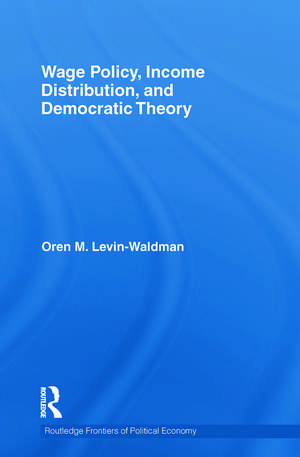Wage Policy, Income Distribution, and Democratic Theory: Routledge Frontiers of Political Economy
Autor Oren M. Levin-Waldmanen Limba Engleză Paperback – 11 noi 2013
This book argues that the evolution in wage policy has paralleled economic transformations, which democratic theory has evolved to accommodate. Through a careful analysis of democratic theory and empirical analysis of the impact of wage policy on income distribution, this book concludes that wage policy is an important component in the maintenance of democratic society. A wage policy that raises the wages of those at the bottom can give workers more independence and power as they are placed on more equal footing with managers. This, in and of itself, can be a source of empowerment, effectively enhancing their autonomy. By doing so, workers feel less exploited and income inequality is reduced.
This significant contribution explores the meaning of democratic theory and how it has evolved along with the meaning and specific forms of wage policy, providing invaluable new insights into their connections. This book will be of interest to postgraduates and researchers in economics and political science, as well as policy practitioners interested in issues of income inequality or democratic theory.
| Toate formatele și edițiile | Preț | Express |
|---|---|---|
| Paperback (1) | 300.01 lei 6-8 săpt. | |
| Taylor & Francis – 11 noi 2013 | 300.01 lei 6-8 săpt. | |
| Hardback (1) | 820.32 lei 6-8 săpt. | |
| Taylor & Francis – 25 oct 2010 | 820.32 lei 6-8 săpt. |
Din seria Routledge Frontiers of Political Economy
-
 Preț: 309.90 lei
Preț: 309.90 lei -
 Preț: 309.79 lei
Preț: 309.79 lei -
 Preț: 316.03 lei
Preț: 316.03 lei -
 Preț: 310.95 lei
Preț: 310.95 lei - 9%
 Preț: 866.82 lei
Preț: 866.82 lei -
 Preț: 309.12 lei
Preț: 309.12 lei -
 Preț: 311.61 lei
Preț: 311.61 lei -
 Preț: 286.99 lei
Preț: 286.99 lei -
 Preț: 327.83 lei
Preț: 327.83 lei -
 Preț: 311.87 lei
Preț: 311.87 lei -
 Preț: 302.76 lei
Preț: 302.76 lei - 9%
 Preț: 938.48 lei
Preț: 938.48 lei -
 Preț: 152.67 lei
Preț: 152.67 lei -
 Preț: 151.97 lei
Preț: 151.97 lei -
 Preț: 318.54 lei
Preț: 318.54 lei -
 Preț: 317.95 lei
Preț: 317.95 lei -
 Preț: 310.01 lei
Preț: 310.01 lei -
 Preț: 326.49 lei
Preț: 326.49 lei -
 Preț: 155.44 lei
Preț: 155.44 lei -
 Preț: 309.79 lei
Preț: 309.79 lei -
 Preț: 328.76 lei
Preț: 328.76 lei -
 Preț: 281.72 lei
Preț: 281.72 lei -
 Preț: 286.58 lei
Preț: 286.58 lei -
 Preț: 386.12 lei
Preț: 386.12 lei -
 Preț: 353.78 lei
Preț: 353.78 lei -
 Preț: 325.09 lei
Preț: 325.09 lei -
 Preț: 310.55 lei
Preț: 310.55 lei -
 Preț: 387.03 lei
Preț: 387.03 lei -
 Preț: 324.87 lei
Preț: 324.87 lei -
 Preț: 312.86 lei
Preț: 312.86 lei -
 Preț: 374.16 lei
Preț: 374.16 lei -
 Preț: 329.09 lei
Preț: 329.09 lei -
 Preț: 348.22 lei
Preț: 348.22 lei - 28%
 Preț: 1047.06 lei
Preț: 1047.06 lei - 18%
 Preț: 1169.45 lei
Preț: 1169.45 lei - 18%
 Preț: 1555.17 lei
Preț: 1555.17 lei - 18%
 Preț: 1048.43 lei
Preț: 1048.43 lei - 18%
 Preț: 1059.84 lei
Preț: 1059.84 lei - 31%
 Preț: 767.47 lei
Preț: 767.47 lei - 18%
 Preț: 731.92 lei
Preț: 731.92 lei - 28%
 Preț: 822.54 lei
Preț: 822.54 lei - 18%
 Preț: 1796.21 lei
Preț: 1796.21 lei - 29%
 Preț: 1184.91 lei
Preț: 1184.91 lei - 18%
 Preț: 1120.23 lei
Preț: 1120.23 lei - 15%
 Preț: 700.95 lei
Preț: 700.95 lei - 18%
 Preț: 1116.31 lei
Preț: 1116.31 lei - 25%
 Preț: 299.52 lei
Preț: 299.52 lei
Preț: 300.01 lei
Preț vechi: 356.90 lei
-16% Nou
Puncte Express: 450
Preț estimativ în valută:
57.41€ • 62.55$ • 48.37£
57.41€ • 62.55$ • 48.37£
Carte tipărită la comandă
Livrare economică 23 aprilie-07 mai
Preluare comenzi: 021 569.72.76
Specificații
ISBN-13: 9780415750110
ISBN-10: 0415750113
Pagini: 240
Dimensiuni: 156 x 234 x 20 mm
Greutate: 0.48 kg
Ediția:1
Editura: Taylor & Francis
Colecția Routledge
Seria Routledge Frontiers of Political Economy
Locul publicării:Oxford, United Kingdom
ISBN-10: 0415750113
Pagini: 240
Dimensiuni: 156 x 234 x 20 mm
Greutate: 0.48 kg
Ediția:1
Editura: Taylor & Francis
Colecția Routledge
Seria Routledge Frontiers of Political Economy
Locul publicării:Oxford, United Kingdom
Public țintă
Postgraduate and UndergraduateCuprins
1. Introduction 2. Democratic Theory 3. Evolution of Wage Policy 4. Post New Deal Era and the Demise of Wage Policy 5. New Living Wage Movement 6. Wage Policy for the Middle Class 7. Wage Policy and the Path Towards Democracy Bibliography
Recenzii
‘For more than twenty years, Oren Levin-Waldman has conducted pioneering work, not only on minimum wages and wage contours, the earned income tax credit, and democratic theory, but also on the living-wage movement in the context of struggles over economic development and conceptions of citizenship. Wage Policy, Income Distribution, and Democratic Theory is the culmination of that work. Looking beyond the Great Recession, Levin-Waldman draws our attention to the equally serious Great Stagnation, a silent depression in wages that has gripped working families in the United States for decades. And he persuasively argues for a pragmatic solution: a combination of institutions and legislation—a wage policy—that can accelerate aggregate demand, boost employment, and spur economic development. But such a policy also has another, equally vital consequence: it can reduce income inequality in a way that enhances personal autonomy, gives meaning to the notion of personal responsibility, and fortifies democracy by strengthening opportunities for political and civic participation. In short, Levin-Waldman has put his finger on what may be the central domestic political issue of our time and the book deserves the widest possible audience in academic, practitioner, and policy circles’.
- Charles Whalen, Visiting Fellow, School of Industrial & Labor Relations, Cornell University, USA
‘For more than twenty years, Oren Levin-Waldman has conducted pioneering work, not only on minimum wages and wage contours, the earned income tax credit, and democratic theory, but also on the living-wage movement in the context of struggles over economic development and conceptions of citizenship. Wage Policy, Income Distribution, and Democratic Theory is the culmination of that work. Looking beyond the Great Recession, Levin-Waldman draws our attention to the equally serious Great Stagnation, a silent depression in wages that has gripped working families in the United States for decades. And he persuasively argues for a pragmatic solution: a combination of institutions and legislation—a wage policy—that can accelerate aggregate demand, boost employment, and spur economic development. But such a policy also has another, equally vital consequence: it can reduce income inequality in a way that enhances personal autonomy, gives meaning to the notion of personal responsibility, and fortifies democracy by strengthening opportunities for political and civic participation. In short, Levin-Waldman has put his finger on what may be the central domestic political issue of our time and the book deserves the widest possible audience in academic, practitioner, and policy circles’. - Charles Whalen, Visiting Fellow, School of Industrial & Labor Relations, Cornell University, USA
"This books makes a useful contribution to the normative and empirical literature on labor policy in the United States. Those interested in the history of wage policy, the political hurdles that tand in the way of its adoption, and the key arguments in favor of a more active wage policy should find it quite interesting." - Nathan J. Kelly, University of Tennessee
- Charles Whalen, Visiting Fellow, School of Industrial & Labor Relations, Cornell University, USA
‘For more than twenty years, Oren Levin-Waldman has conducted pioneering work, not only on minimum wages and wage contours, the earned income tax credit, and democratic theory, but also on the living-wage movement in the context of struggles over economic development and conceptions of citizenship. Wage Policy, Income Distribution, and Democratic Theory is the culmination of that work. Looking beyond the Great Recession, Levin-Waldman draws our attention to the equally serious Great Stagnation, a silent depression in wages that has gripped working families in the United States for decades. And he persuasively argues for a pragmatic solution: a combination of institutions and legislation—a wage policy—that can accelerate aggregate demand, boost employment, and spur economic development. But such a policy also has another, equally vital consequence: it can reduce income inequality in a way that enhances personal autonomy, gives meaning to the notion of personal responsibility, and fortifies democracy by strengthening opportunities for political and civic participation. In short, Levin-Waldman has put his finger on what may be the central domestic political issue of our time and the book deserves the widest possible audience in academic, practitioner, and policy circles’. - Charles Whalen, Visiting Fellow, School of Industrial & Labor Relations, Cornell University, USA
"This books makes a useful contribution to the normative and empirical literature on labor policy in the United States. Those interested in the history of wage policy, the political hurdles that tand in the way of its adoption, and the key arguments in favor of a more active wage policy should find it quite interesting." - Nathan J. Kelly, University of Tennessee
Notă biografică
Oren M. Levin-Waldman is Professor of Public Policy and Public Administration in the School of Management at Metropolitan College of New York, USA.
Descriere
This significant contribution explores the meaning of democratic theory and how it has evolved along with the meaning and specific forms of wage policy, providing invaluable new insights into their connections.















